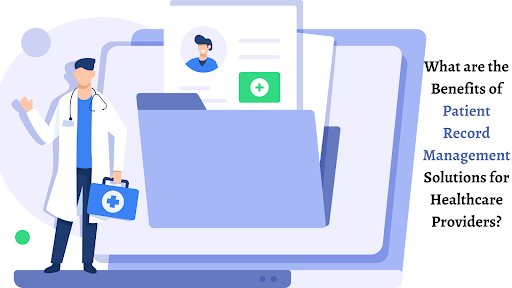What are the Benefits of Patient Record Management Solutions for Healthcare Providers?
Healthcare providers must adopt patient record systems for real-time data and visualization of medical reports, ensuring digital and pre-structured patient data for hospital use.

Effective patient record management is strictly required in this data-driven world of healthcare. With the massive, growing volume of patient data every day, managing, storing, and recovering medical records is demanding for healthcare providers. Traditionally, this was done manually, leading to inefficiencies, conceivable errors, and logistical complications. With the advancements in digital health solutions, PRM systems have evolved into indispensable tools for healthcare providers.
These solutions enable effective patient information management, reduce paperwork, and enhance the quality of care. Among many others, here are some benefits a health provider would draw from using patient record management solutions.
What is a Patient Record System?
The Patient Record System collects information from sources inside and outside the walls. Sources include prescription reports, radiology reports, allergy information, the patient's medical history and treatment plan, and diagnosis reports.
On the other hand, external sources mean grasping the patient's medical records beyond the hospital, such as pharmacy bills, consultation records, and detailed patient insurance information, in one system.
This electronic medical record has many advantages, such as paper documentation, ambiguity, redundancy, minimization of effort towards duplication, and reduced medication errors. In short, it eases the patient's health routine through uniform medication reminders.
Advantages of Patient Record Management Solutions for Healthcare Providers
The computer-based patient record keeps real-time patient records to increase patient safety and to assimilate clinical data in an organized way to simplify the data retrieval process. Electronic medical record systems have several advantages. Generally, it offers information related to patients in real-time, which has countless benefits for healthcare app development, including:
1. Improved Patient Care
Efficient patient care lies at the core of any successful healthcare practice. Patient management software is vital in improving the quality of care rendered to patients. The application of PMS will help centralize information about patients and communicate it effectively in the most streamlined mode. This ensures quick and easy access to accurate patient data by healthcare providers. It leads to more informed decision-making and personalized treatment plans.
2. Enhanced Efficiency
In healthcare, appointment management, billing, and patient record keeping can be cumbersome and vulnerable to errors. PMS automates these processes and thereby renders them efficient and reliable.
PMS can also process billing and insurance claims electronically, thus reducing the number of times manual data entries have to be made and less likely to make errors. This will save time for administrative staff and accelerate reimbursement, which will help cash flow in the clinic.
3. Better Data Management
Healthcare app development provides an excellent solution by making the storage of patient records safe and easily accessible. This digitization of patient information ensures that all patient records are put into a centralized, secure database, making them secure and retrievable whenever necessary for authorized personnel.
Generally, the PMS stores patient medical information in standardized Electronic Health Records. EHRs give a provider access to nearly all of a patient's history, including what treatments, drugs, and tests were administered in just a few mouse clicks.
4. Increased Patient Engagement
Confronting the patients in their care is indispensable for better results. Patient Record Management solution offers several levers that expand communication between the patient and the provider.
PMS proposes web-based portals where patients can access their health details, schedule appointments, request prescription refills, and intercommunicate with healthcare providers online. This allows patients to be more engaged in handling their health.
5. Cost Savings
One of the benefits of adopting Patient management software is the reduction in operational costs through automation. PMS advances healthcare providers in facilitating various administrative tasks, lessening administrative fees, and saving money.
In addition, electronic records eliminate the costs of printing, storing, and maintaining paper-based records. Therefore, a health provider saves more money on patient care.
Conclusion
In short, healthcare service providers must adopt patient record systems in the hospital if they want data for the hospital and real-time patient information. Computerized provider order entry records patient data both digitally and in a specified pre-structure and may help present a visualization of medical reports.
Healthcare CRM development integration into these systems can further enhance patient engagement and smooth out communications. Hence, it has many advantages, such as improved patient safety, correct data about the patient, support for the preparation of drugs, and excellent data analytics. Therefore, it supports medical predictive analytics and decreases the costs related to the health system.
What's Your Reaction?

















